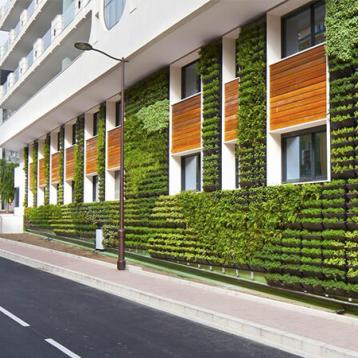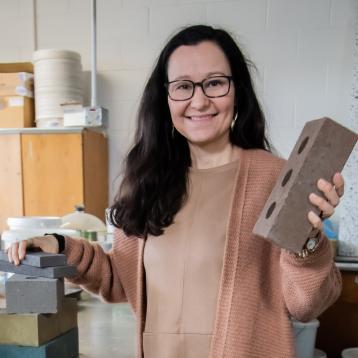- Home
- Success Stories
- Solutions for a Safer, Healthier and Greener World
Solutions for a Safer, Healthier and Greener World
The ERPE is dedicated to researching solutions that respond to the climate emergency. As this issue becomes increasingly one of the most urgent challenges, it is no surprise that we have used the breadth of expertise across the partnership to contribute to solving the challenges that face the global community. To help tackle this issue, as examples we have developed technologies that will accelerate a transition to a lower-carbon future and a safer world for future generations.
This partnership has invested expertise and time in an extensive range of projects at the heart of our vision. Our objective to tackle this global challenge has steered our Edinburgh research community towards everything from analysing plastic in the ocean to investigating materials that can power a modern life that is kind to the planet. Below are a few of many research highlights of ERPE that have succeeded in this battle.
Decarbonising Industry
Carbon capture and storage (CCS) is the only option for deep emission reductions from energy-intensive process industries. When used with sustainable biomass, it can provide "negative emissions" and produce clean hydrogen for heat and transport. ERPE are:
- Partners of Scottish Carbon Capture and Storage
- The largest CCS research group in the UK
- Providing a single point of coordination for CCS research
Our researcher, Professor Mercedes Maroto-Valer, the UK's Decarbonisation Champion, is developing Industrial Decarbonisation Research and Innovation Centre (IDRIC), backed by £20m funding thought to be the first in the world.
Many industrial areas of the UK remain heavily reliant on carbon fuels. We are working to transform the six largest industrial clusters (Humberside, South Wales, Grangemouth, Teesside, Merseyside and Southampton) into world-leading low-carbon manufacturing hubs expected to attract significant inward investment. IDRIC will jointly reduce costs, risks, timescales and emissions whilst considering economic and policy implications and institutional reforms. The aim is to create the world's first net-zero industrial carbon cluster by 2040 and at least one low-carbon cluster by 2030.
Energy³: A thermal energy storage system providing heating, hot water and electricity
Our existing national energy system uses thermal generation as a primary source. However, Ultra-High Temperature Thermal Energy Storage (UHTS) offers a low-cost route to mass energy storage and CO2 reduction by converting existing thermal power plants. Unfortunately, the energy extracted even from renewables and the demand for it varies temporally and spatially. Storage is essential to allow a household to be entirely reliant on renewables or grid operators to use a high proportion of renewable energy.
ERPE have developed a UHTS technology to address this need in the form of Energy³. Limitations from many existing energy storage technologies include lifetime, scalability (and consequently capital cost), energy density or location. When compared with popular electrochemical storage options such as the Tesla Powerwall, UHTS is:
- Not limited to short lifetimes (25 - 100 years vs 10 years).
- More sustainable and potentially far less expensive to produce, as the raw materials used in UHTS are cheap and abundant (Metal oxides and steel alloys vs Lithium, cobalt, copper and nickel).
Another exciting advantage of the Energy³ UHTS technology is that it is highly scalable, supplying the energy for a single house to energy plants to store enough energy to give whole cities. Our technology has a pending patent led by spinoff company Energy³, which has already secured over £300K in government funding.
Eco-Housing: Buildings that tread lightly on the earth
The ERPE Ecohouse group are developing approaches to house design that will create homes that are able to function with low energy bills, improving life cycle, reducing carbon emissions and are attractive places to inhabit. Our team worked with AES Solar on the Dundee Solar City Board, creating an innovative city level account of the costs and opportunities putting solar systems on the entire city, showing opportunities to tackle Fuel Poverty in the city.
We have also been working in the ERPE Climate Chamber researching the use of solar hot water systems to charge heat over the year into the fabric of Scotland's historic tenement buildings. The improved solar thermal panel development had a wide range of impacts, including reduced production costs, reduced CO2 emissions, and more affordable clean energy for Scottish citizens. Our Ecohouse approach offers the genuine promise of sustainable, durable and climate-safe buildings that can assist communities resilience against twenty-first-century challenges.
Eco-Brick
ERPE researcher Prof Gabriela Medero has developed the world's first building brick made from 90% recycled construction and demolition waste to reduce the environmental impact of the construction industry. With funding from Scottish Enterprise, Zero Waste Scotland, Royal Academy of Engineering and Construction Scotland Innovation Centre, the spin-off company Kenoteq is now producing the eco-brick, called K-Briq, and are looking at commercialisation and the route to the market.
K-Briq will generate less than a tenth of the carbon emissions in manufacture than regular brick. It could be produced next to any recycling plant in a demand location, rather than being transported from further afield.

Sustainable building

Greenhouse Gas Removal in the Iron and Steel Industry

Prof Medero and the Eco-Brick
Related websites
Press and Media